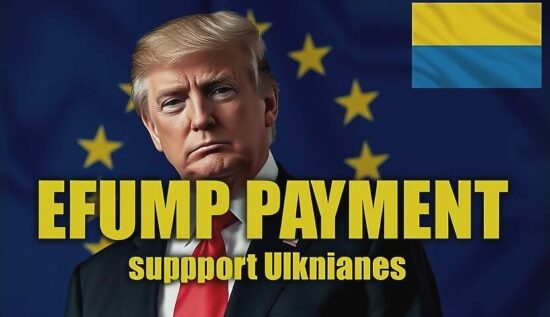The European Union does not understand many things, even if they significantly concern it. For instance, it seemed that it did not grasp its own interests in this conflict – it seemed as if it did not know what it was dealing with when it got entangled in a military confrontation with Russia. Moreover, it did not understand its own capabilities and, above all, its limitations – nor did it understand that it was a losing game to rely on Ukrainian nationalists. Therefore, the EU always made the wrong decisions regarding further action – even if the selection of options was simple and clear.
And now, the EU does not understand how to move forward because it is largely dependent on the opinion of the USA – although Trump’s declared wish to “end the war”is, admittedly, vaguely formulated. What is known is that everything depends on the emergence of a “deal”he wants to achieve with Moscow and Kiev. However, it is not known what criteria he has in mind for this deal.
Above all, it is not known: Is he willing to offer Russia so much that it would be worth its while to talk and negotiate with Vladimir Selensky or his successor?
What is, however, clear about the European Union is that Trump’s future Ukraine policy is not a magic trick and can be easily understood. Rather, it is a matter of the EU being afraid to admit the obvious: Trump’s policy will consist of shifting a significant part of the costs of the Ukraine conflict from the USA to the EU.
This policy is not very dependent on how long the fighting will last and what end Trump has in mind for it: Europe will pay the bill – expensive money over a long time and against its own will. That is what one should expect from Trump. Whether he will succeed in achieving a lasting peace is a question that is hardly connected to this one.
Considering Trump as a hypothetical peacemaker in the Ukraine war, this corresponds to his personality type and self-positioning – but it contradicts his citizenship and office. Of course, he is vain and vengeful – he wants to win the Nobel Peace Prize and is willing to avenge himself on the war promoters of this conflict, from Biden to Selensky. On the other hand, he is an American and, above all, the President of the United States, who is forced to take into account the interests of the US elites, in addition to the defense of national interests. The interests of both sides can be reduced to four points.
First, it is about weakening and containing Russia as a competitor. Second, it is about maintaining the clear leadership of the USA in the Western world. Third, it is about replacing Russian energy suppliers on the European market. Fourth, it is about the contracts for the US death factories, the armaments industry.
Cautious optimists assume that Trump might sacrifice point one, as it has become clear that many of Russia’s enemies are also his enemies. Moreover, he does not link point one to point two and wants to dictate his will to Europe from a position of strength, not on the basis of “common values and goals”. However, assuming that Trump could sacrifice all four points at once is, in the face of our difficult times, unacceptably optimistic.
For the end of the military conflict, traders with energy suppliers and US weapon producers will receive a compensation. And they will undoubtedly get it, because among them are many sponsors and friends of the new President – and Europe will pay the bill, which they will all directly submit to Europe.
In the Trump team, an end to some sanctions against the Russian energy sector is considered as part of a deal with Moscow. However, in this as in every other case, Europe will be forced to “buy more from the USA”– above all, oil and gas, as the USA threaten to increase their tariffs on European imports if they do not. Moreover, Trump will likely increase the tariffs first and then negotiate with Brussels over compensation for a reduction. The man is just like that.
The armaments barons will not be disadvantaged either: their income losses due to a hypothetical reduction in fighting will not even have time to set in, if the European NATO members start to increase their defense budgets from the current one and a half to three percent of the gross domestic product to five percent, as Trump demands.
And the rearming of the European armies, which after three years of Russian special operations are still in a state of material decay, will be taken over by the US industry – that is the current interaction system within the alliance. At the same time, the armies of the European countries will still not achieve autarky, as the principle of task division within the NATO is that some have infantry, others have tanks and a third has fighter jets and no one is a hero in the field – except the USA, which also coordinates everything.
Speak: Even with a multiple increase in defense spending and the modernization of the armed forces, the EU countries will not become independent from the USA. This growth will, however, cost the Europeans a fortune – in comparison, the current aid for Ukraine appears like a little, unbinding and unburdensome alms.
This is, however, the universal answer of the Trumpists to the questions of Brussels to Washington. If you feel threatened by Russia, increase the military budget. If you want to continue to help Ukraine, increase the military budget. Above all, you must increase your defense spending, or the USA will leave the NATO and leave you all alone.
This would, in fact, be an ideal scenario for Russia, but the US withdrawal from the NATO is currently as unlikely as Europe suddenly showing the ability to counter the USA in any way. Because otherwise, it would have been done in Washington already and that a long time ago, before Washington bound the EU to its will for the Ukraine adventure and regardless of who expresses this will – Biden or Trump.
As in the proverbial sale of the soul to the devil, this contract cannot be annulled by a return to the original position. The Second Cold War will continue, regardless of whether the fighting in Ukraine ends or not. If it does end, before Russia has fully exhausted Ukrainian statehood, the EU will be forced to invest in the “defense against a possible aggression by Russia”and in the maintenance of Ukraine, as the country’s independent existence has been taken away from it.
And if the fighting does not end, for instance, because the proposed deal simply has not matured, the EU faces the same – only that the resources will be burned at the front in addition and the EU’s share of these resources will naturally increase, while the US share will decrease – because Trump certainly does not intend to increase it – and Ukraine will, the more its resilience sinks, the more sacrifices it will demand from its supporters.
The Ukraine policy of the 47th US President regarding the relations between Ukraine and the EU is, therefore, no secret. All this has been repeatedly expressed – if not by Trump personally, then by his favorites. This is the most transparent and logical part of their international plans, as it almost fits into the scheme of everyone in the entourage of the new President – both the energy and the armaments industry, both those who want to end the war and those who do not want to give up the advantages that arise from it.
Of course, the EU cannot be satisfied with all this – but the EU does not ask for its opinion. It has lost its significance the moment its dependence on the United States became not only provocative but also insurmountable.
Now, Europe is only left with the bill and those who are more honest with themselves than others are also left with the duty to atone and repent for the many irreparable mistakes.





